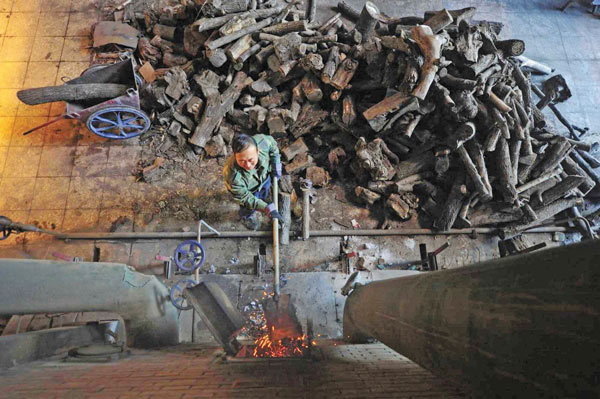 |
|
Beijing has begun switching all coal-fire heating facilities, such as the one pictured above, to clean-energy powered systems. Fu Ding / for China Daily |
Green heating
Beijing is striving to make its coal-fired heating facilities go green in response to public concern over the city's poor air quality, especially during the heating season.
The capital vows to shut down all coal-fired boilers by the end of 2015 in the central six districts of the capital.
Gas-fired plants with advanced environmental protection technologies will be the first choice to ensure heat supply to Beijing residents, according to the Beijing Environmental Protection Bureau.
As part of the Clean Air Action Plan, which was unveiled in September, the city plans to restrict the amount of coal consumption to within 10 million tons by the end of 2017, a 13 million ton reduction compared with the 2012 level.
The government has started a project to replace coal-fired heating facilities in homes with electric ones since 2001. More than 200,000 residents in downtown Beijing have benefited from the project.
According to the capital's clean air plan, the homes of more than 440,000 downtown residents, mainly in the Dongcheng and Xicheng districts, will be switched from coal-fired heating to electric heating. Another 210,000 homes will turn green by the end of 2015.
"It's necessary the government further supply the residents with clean energy in heating and power supply," said Fang Li, a spokesman for the Beijing Environmental Protection Bureau.
The electricity powered heating facilities are equipped with an automatic temperature control system, which will suspend the heat supply automatically when the room temperature reaches a certain degree, in an attempt to conserve energy.
As a public social welfare project, the government will subsidize two-thirds of the electric heating facilities and the public will pay 750 yuan ($125), a third, of the price.
The project has reduced emissions of carbon dioxide by 524,000 metric tons, sulfur dioxide by 17 million tons, and nitric oxide by 14.8 million tons.
Clean energy will take up some 90 percent of energy consumption, with coal's share reduced to below 10 percent.
Green routes
People in Beijing will be able to enjoy more green space in the next five years, as city officials look to eco-friendly projects to curb pollution.
The city government said in July it aims to build more than 1,000 kilometers of green routes, including cycle lanes and paths, to improve air quality.
Beijing Daily reported that the captial will build 200 km of green areas along the Second Ring Road and East Forestry Park as a pilot project this year.
Costing 3 billion yuan, the project will create a network of areas that will connect more than 200 parks, scenic spots and historical sites, according to the Beijing Development and Reform Commission.
The paths will offer more space for pedestrians and cyclists, who often complain about lanes being occupied by vehicles during rush hour and traffic jams.
According to the government, 5.35 million vehicles are registered in Beijing and vehicle exhaust is among the top sources of air pollution.
The construction of other green areas will include parks and wetlands.
This year, the city plans to plant more trees and the forest coverage rate will reach 40 percent at the end of this year, Beijing Bureau of Landscape and Forestry pledged.
At the end of this year, 15 more city parks will be constructed.
According to the five-year Clean Air Action Plan, Beijing will construct 10 wetland parks and 10 wetland protection zones at the end of 2017.
The rate of woodland coverage will reach more than 60 percent, the plan states.
Green workshops
More than 2,000 polluting workshops have been closed in the biggest industrial district in the capital's suburbs.
To weed out outdated capacity, more than 2,000 polluting small businesses have been scrapped in Fangshan district over the past few years, including coalmines, clay brick factories, chemical plants, paper mills and cement plants.
"Pollution from the exploitation and transportation of coal mines used to be one of the major pollutants in the district, and the shutdown of the small-sized coalmines will greatly improve air quality," said Wang Kaicheng at the district environmental protection bureau.
The district is also focusing on the upgrade of the industrial structure, aiming to introduce more high-end and advanced manufacturing industries, he said.
The move is in accordance with the Clean Air Action Plan, which aims to reduce pollutant intensity in the city while making Beijing a more livable place.
According to the action plan, the annual concentration of particulate matter has decreased by more than 30 percent, around 65 micrograms per cubic meter.
